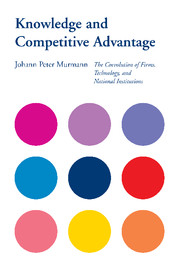Book contents
- Frontmatter
- Contents
- Series Editors' Preface
- Author's Preface
- Acknowledgments
- Timeline of Key Events in Development of the Synthetic Dye Industry before 1914
- CHAPTER 1 Introduction
- CHAPTER 2 Country-Level Performance Differences and Their Institutional Foundations
- CHAPTER 3 Three Times Two Case Studies of Individual Firms
- CHAPTER 4 The Coevolution of National Industries and Institutions
- CHAPTER 5 Toward an Institutional Theory of Competitive Advantage
- Appendixes
- Bibliography
- Index
Series Editors' Preface
Published online by Cambridge University Press: 06 August 2009
- Frontmatter
- Contents
- Series Editors' Preface
- Author's Preface
- Acknowledgments
- Timeline of Key Events in Development of the Synthetic Dye Industry before 1914
- CHAPTER 1 Introduction
- CHAPTER 2 Country-Level Performance Differences and Their Institutional Foundations
- CHAPTER 3 Three Times Two Case Studies of Individual Firms
- CHAPTER 4 The Coevolution of National Industries and Institutions
- CHAPTER 5 Toward an Institutional Theory of Competitive Advantage
- Appendixes
- Bibliography
- Index
Summary
By blending historical evidence with evolutionary economic theory, Johann Peter Murmann enhances our understanding of economic change and helps us see why firms and nations prosper or fall under the pressure of competitive capitalism. Central to this process in the Second Industrial Revolution was the ability to apply scientific knowledge to industrial processes in the electrical and chemical industries.Murmann surveys with great care the early development of one of those industries, synthetic dyes — an often-told story, but now placed in a new and exciting comparative context. Great Britain had the early lead in dyestuffs, but Germany parlayed a powerful scientific establishment and aggressive entrepreneurial firms into a successful challenge. Favored by its unique research institutions and patent laws, the German industry was able to lobby the government to strengthen its position even more. Coevolution of firms and national institutions was at the heart of a process that had important ramifications for the political economy of Europe and the United States in the nineteenth and twentieth centuries. Firms maintaining strong links to the relevant scientific networks prospered; their competitors gave way.
Murmann's dynamic model of this process should be of great interest to economic and business historians, economists, and scholars analyzing business management and strategy in the modern era. We are pleased to publish this innovative study as the second volume in our series, Cambridge Studies in the Emergence of Global Enterprise.
- Type
- Chapter
- Information
- Knowledge and Competitive AdvantageThe Coevolution of Firms, Technology, and National Institutions, pp. xiiiPublisher: Cambridge University PressPrint publication year: 2003



